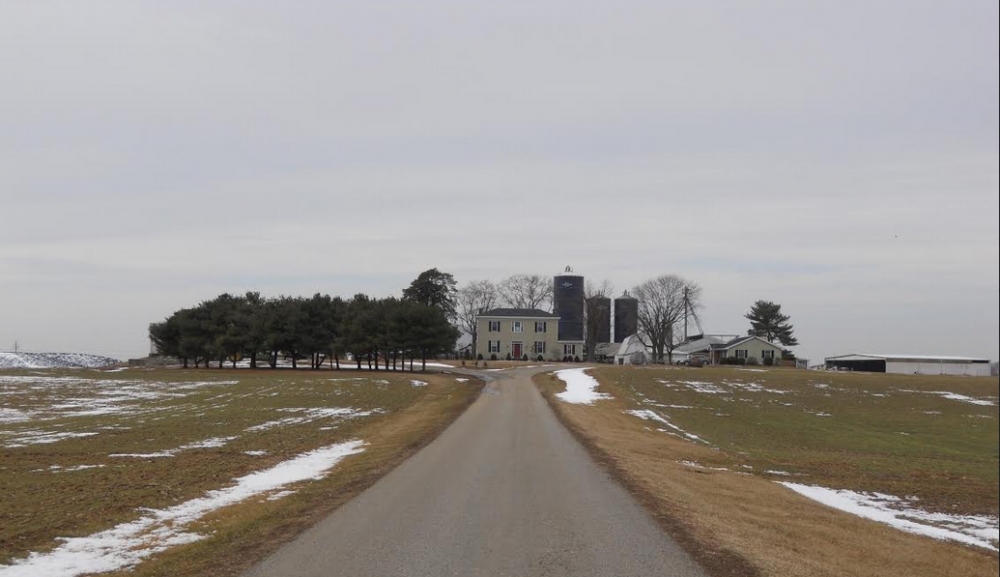Ed and Marian Fry and their son Matt, and his wife Meg, are again expanding operations on their dairy farm, 54 years after Ed’s father first established the farm in Kent County. The expansion is made possible with an easement by Eastern Shore Land Conservancy and Maryland Environmental Trust.
Putting land under easement fulfilled a couple objectives for the family, said Matt. The farming business and the land were owned by different entities. A corporation owns the business, and a limited partnership consisting of extended family members not involved in the business owned the land.

The Fry Family
Selling a scenic conservation easement on the farm allowed Matt and Meg buy the land. It also helped meet the vision his grandfather would have laid out for the land – that it stay a working farm.
In the 1960s, Matt’s grandfather, Ed’s father, moved away from his dairy farm in Montgomery County and started his farm in Kent County. Montgomery County was growing, and he knew he would not be able to farm the way he wanted to for very long.
The sale was satisfying for extended family members, as well. Although they did not want to encumber the farm to pay for major building improvements for the farming operation, they did want farming to continue on the land in the manner their grandfather intended. The easement allowed them to get their value from the property and see the farm remain profitable.
“This is what we call the home farm here,” Marian said of the dairy and organic grain operation outside of Chestertown.
Matt and Meg, both Virginia Tech graduates, settled in Kent County to farm. Matt has been farming with his parents since 2007. He now manages the dairy herd and also participates in management decisions for the larger farm.
The Frys recently expanded the dairy herd. Now, 470 cows are milked three times a day. New construction and expansion of buildings helped modernize operations and increase capacity.
“The easement was the keystone in allowing that to happen,” said Ed Fry.
This multigenerational, diversified business includes three contiguous Kent County farms totaling 775 acres. Of that, 565 acres are protected in perpetuity. An organic alfalfa, hay, corn and soybean operation accounts for about 600 acres. They also raise conventional crops to feed the dairy herd, which is not organic.
They got into organic grain about 18 years ago when Ed Fry learned Horizon organic dairy bought a farm he originally built in 1980. Their goal, he said, was to have a 500-head organic farm in Kennedyville. Ed Fry saw an opportunity. Horizon was a customer for many years, although they are not now.
 “Both conventional farming and organic farming have advantages,” Marian said. Conventional, no-till farming is good for the bay because it reduces runoff, but organic farming requires less chemical treatment. Marian said the family often combines techniques as the land requires, and that helps them take advantage of the benefits of both systems.
“Both conventional farming and organic farming have advantages,” Marian said. Conventional, no-till farming is good for the bay because it reduces runoff, but organic farming requires less chemical treatment. Marian said the family often combines techniques as the land requires, and that helps them take advantage of the benefits of both systems.
“We want our lands to be sustainable, because if not they are not going to have farming on our open land in perpetuity,” said Ed Fry. “And the farm has to be sustainable because if the farmer is not sustainable, then the land won’t be sustainable either.”
Marian said it’s easy for people to become polarized on farming issues when they are several generations removed from farming. They can forget the purpose is to grow food.
“We are so fortunate in the country to have plenty of food and not to have famine like other countries know,” she said. We have sustainability in every region of the country, so we are never relying on other countries.
Easements help ensure the opportunity to practice farming remains on the Delmarva Peninsula, she said.
This easement was made possible with federal funds to preserve properties along the Chesapeake Country National Scenic Byway. Former Congressman Wayne T. Gilchrest (now Director of ESLC’s Sassafras Environmental Education Center) worked hard while he was in office to provide this funding. It is the sixth easement along the byway, which includes portions of state routes 213 and 20 in Cecil, Kent, and Queen Anne’s counties.



Write a Letter to the Editor on this Article
We encourage readers to offer their point of view on this article by submitting the following form. Editing is sometimes necessary and is done at the discretion of the editorial staff.